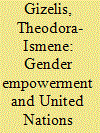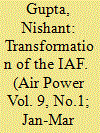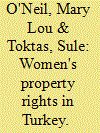| Srl | Item |
| 1 |
ID:
078276


|
|
|
|
|
| Publication |
2007.
|
| Summary/Abstract |
Migrant workers, meaning those who used to be farmers but have left rural areas and found jobs in cities as a result of economic reform and rapid development in China, have made a significant contribution to the burgeoning labor market and played an important role in speeding up the transition from a planned to a market economy. This present paper considers the economic status and social attitudes of migrant workers. It is based on the analysis of a large-scale survey in 2006, which was conducted using questionnaires and covered 28 provinces, municipalities and autonomous regions throughout the country. It was found that the income status of migrant workers depends heavily on the education and technical skills that they have developed, rather than on identity-based discrimination. Surprisingly, it was also found that those on less income and of lower economic and social status show more positive attitudes to society than those who are affluent and considered of higher social status. It is concluded that the decisive factor in attitude and behavior of migrant workers is historic rather than economic.
|
|
|
|
|
|
|
|
|
|
|
|
|
|
|
|
| 2 |
ID:
090137


|
|
|
|
|
| Publication |
2009.
|
| Summary/Abstract |
Previous studies have suggested that societies where women have higher social and economic status and greater political representation are less likely to become involved in conflict. In this article, the author argues that the prospects for successful post-conflict peacebuilding under the auspices of the United Nations (UN) are generally better in societies where women have greater levels of empowerment. Women's status in a society reflects the existence of multiple social networks and domestic capacity not captured by purely economic measures of development such as GDP per capita. In societies where women have relatively higher status, women have more opportunities to express a voice in the peacemaking process and to elicit broader domestic participation in externally led peacekeeping operations. This higher level of participation in turn implies that UN Peacekeeping operations can tap into great social capital and have better prospects for success. An empirical analysis of post-conflict cases with a high risk of conflict recurrence shows that UN peacekeeping operations have been significantly more effective in societies in which women have relatively higher status. By contrast, UN peacekeeping operations in countries where women have comparatively lower social status are much less likely to succeed.
|
|
|
|
|
|
|
|
|
|
|
|
|
|
|
|
| 3 |
ID:
130815


|
|
|
| 4 |
ID:
129557


|
|
|
|
|
| Publication |
2014.
|
| Summary/Abstract |
This article takes Turkey as a case study, exploring marital and inheritance regimes with regard to their impact on women and their ability to protect women's property rights. The aim of the study is to bring to light the workings of the legal system that regulate the acquisition of property and to scrutinize the gap between the law and its practice in Turkish society. By taking this approach, the article does not only focus on laws but also on how these laws are adopted by society. Thus, two levels of analysis-de jure and de facto-are utilized for an investigation of women's property rights and hence their social and economic status.
|
|
|
|
|
|
|
|
|
|
|
|
|
|
|
|